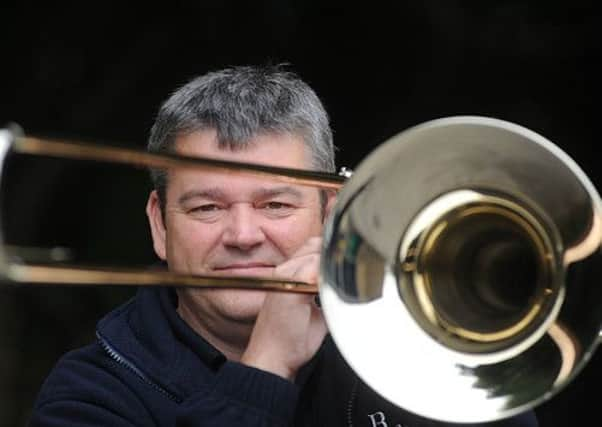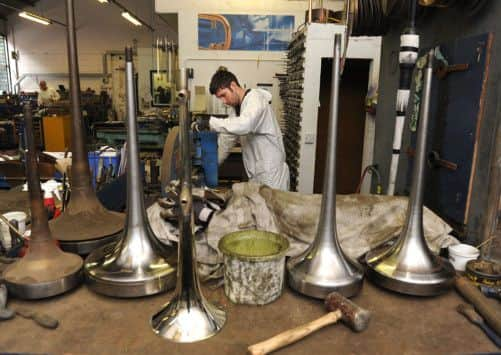Top brass – and made in Yorkshire


IT’S A long stride from the world’s greatest concert halls to a converted mill on the outskirts of Huddersfield, full of whirring lathes and lengths of brass tubing hanging from racks, but this workshop has forged a link of musical excellence between them.
For it’s here that some of the most-highly regarded brass instruments money can buy are handmade, each crafted by a small team of friends and neighbours, customised and polished to mirror-like brilliance before going out to players in Europe, the Far East, South America and the United States, who gladly pay many thousands of pounds.
Advertisement
Hide AdAdvertisement
Hide AdThey are to be heard in the ranks of the London Philharmonic Orchestra and Berlin Opera, and in the jazz clubs of the US. Musicians backing Frank Sinatra and James Brown used them, and, closer to home, so do the Grimethorpe and Black Dyke brass bands. They are on the soundtrack of hit records, on television shows and in theatre orchestras.


Trombones are what they make here, each with a distinctive capital letter “R” in the curve of the tuning slide, for the man who founded this company, Michael Rath. And though he knows everything there is to know about trombones, how to fit them to a player like a glove, how to use varying combinations of metals to achieve exactly the sound required from each instrument, he doesn’t play any of them.
He’s a tuba man, though even that doesn’t get played very often these days, what with the travelling and emails in response to the growing international demand for his instruments. He’s just back from Japan where he was talking trombones, and some of his audience had flown 1,000 miles to listen. China, Taiwan, Poland and Czechoslovakia beckon, and there are emails to answer from Brazil and Venezuela, as well as 5,000 Facebook followers to keep up with, for whom this small corner of Yorkshire is a musical Mecca.
Yet when there’s complicated work to be done on building one of the instruments, Michael still rolls his sleeves up and takes his place at one of the benches, sometimes using tools he’s had – and made – since he was 15.
Advertisement
Hide AdAdvertisement
Hide AdHe’s made most of his workforce from scratch as well, teaching them everything they know about the immensely skilful and painstaking business of building trombones. Including himself, there are 12 in all, a tight-knit bunch from disparate backgrounds.
His workshop manager is a friend of 35 years who he met when both were playing in brass bands. Two are close neighbours he got to know when they babysat for him, another is an electrician who came to do some work and decided doing this was more fun. Over there is a man who used to make balustrades, not trombones, and nearby is someone who switched from car maintenance. Most have learned their craft from the ground up, the youngest being started on polishing components to gain a feel of working with their hands.
Michael, 50, also started from the ground up. The journey that is now taking him and his instruments around the world began in a shed he and his father built in their back garden, where he repaired instruments, among them those played by 80s chart-toppers Dexy’s Midnight Runners.
It has not been without its problems. The bailiffs have come knocking in the past, Michael has gone without pay before now, and he suffered the grievous loss of his business partner, killed in a motorcycle accident aged only 26.
Advertisement
Hide AdAdvertisement
Hide AdThe future, though, looks bright. The reputation of Rath trombones is growing internationally, and so are sales. They make about 350 of them every year, and it can’t be rushed, each taking between 35 and 70 hours. The bell of each instrument alone takes about 10 hours of patient heating, hammering and shaping, and assembling the tuning slide another four.
It’s an atmosphere of quiet concentration, with discs of brass being cut and moulded into bells, tubes being stretched, blowlamps turned on the metal to harden it, the parts of the instruments polished to a mirror finish and then lacquered to preserve their sheen.
“Not only does it have to play nicely, it has to look immaculate,” said Michael, who lives in Holmfirth with his wife, Nicola, and their two sons, just a couple of miles from his workshop in Honley.
He grew up in Windsor, where the sight of military bands inspired him to take up the tuba. He wanted a career in music, but thought that earning a living from the tuba would be precarious, opting instead to train in instrument repair, before landing his first job with the old-established Covent Garden company, Paxman, which made French horns.
Advertisement
Hide AdAdvertisement
Hide AdMichael stepped out on his own with the shed in his parents’ garden, where he repaired instruments on a freelance basis.
He came north in 1990, setting up a shop in Bradford with a friend, before going it alone once more, gaining a reputation as a specialist in trombones.
“I just had lots of friends who were trombone players.
“I don’t know why, it was just the way it was,” he said. One of them was Mark Nightingale, a leading British player.
“Mark asked me when I was going to make my own trombone, and others had mentioned it as well, so I thought, ‘OK, we’ll try it’.”
Design work followed, and so did a lot of trial and error.
Advertisement
Hide AdAdvertisement
Hide Ad“The goal was to make the trombone that makes the job easier. There are instruments out there that don’t make it easy.
“Our goal was to make an instrument that works well, has good playing characteristics and good intonation. I was trying to do this out of cashflow, without borrowing too much money, and it was hard work, but we made the first one.”
It was 1996 when the first model went into production, and word began to spread amongst top professional musicians.
“You gain a reputation then, you get gradually more and more people seeing it and records being made and going out, and people gain some confidence. One player was telling two, two were telling four and so on, and that’s how it grew.”
Advertisement
Hide AdAdvertisement
Hide AdThe reputation of the trombones made in Huddersfield spread in the United States, thanks to the praise of a leading jazz player, Conrad Herwig, but Michael’s future was far from secure.
“Ten years ago, the bailiff was knocking at the door. At that point I was trying to do everything myself, and six weeks before Christmas I get the knock at the door. It was a nightmare. I went home to Nicola, and said, ‘I’ve had the bailiff in today’, and she knew nothing about it, and she said, ‘What does it mean’, and I said, ‘If it all goes wrong, they’ll put us in a council house’.
“I didn’t think I had ever put everything on the line, but I had. At one point, we were drawing £300 out on my credit card to put back in the business, but I never let down the guys on wages. They’ve always been paid, even if I haven’t.
“You’ve got to have determination, and I’m very proud of what we’ve achieved. I could have packed it in a long time ago.
Advertisement
Hide AdAdvertisement
Hide Ad“It’s very difficult when you’ve worked so hard and been so skint. I’ve still got tools that I made when I was 15 in the shed, we were so skint.”
The bailiffs are not likely to be returning, with Michael striking a deal with a manufacturer in China to make a range of reasonably-priced instruments aimed at young people.
It’s been a long road from the shed in Windsor, and Michael wishes his father, Patrick, who died about nine years ago, was here to see how far it has led.
“When my dad died, I got a phone call on Sunday morning, and I said, ‘I am coming down, but first of all I’ve got to polish and lacquer five trombones’, and it was just a shame that he never saw what we ended up with, because I’d have liked him to.”
Michael Rath Trombones can be found at www.rathtrombones.com